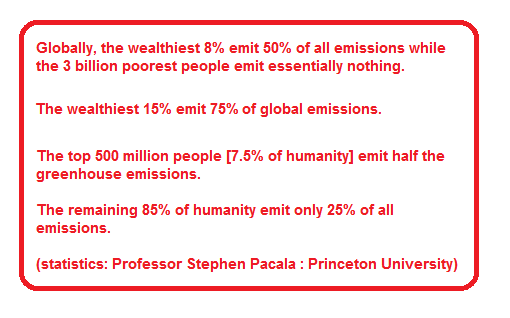Climate Justice recognises that climate change has the potential to link seemingly separated issues and seemingly seperated communities not just as victims, but as people fighting for a better world, together.
A diverse and creative climate justice movement is growing globally to combat the root causes and effects of climate change and biodiversity loss. At the heart of the movement there is a principle which connects its diverse and localised efforts and differentiates it from other approaches to dealing with climate change: a recognition that the massive environmental crises we face are consequences of deep, fundamental and unequal economic and social power relations.
Climate Justice recognises that underdeveloped or poor countries and peoples, especially Indigenous Peoples, small farming-based communities and women, will be and already are the hardest hit by the effects of climate change. However, the vast amount of historical responsibility for climate change lies with rich people, businesses and industrialised countries.
Mainstream debate and discourse around climate change does not challenge the ideas of a profit-driven economic system which in large part created the problem, and instead uses its logic to come up with ‘solutions’ that ignore the root causes of climate change; carbon calculations that reduce the problem to a matter of quantifying molecules of carbon in the atmosphere obscuring the political dimensions of climate change, ‘technological quick-fixes’ that do not challenge the industries that are causing climate change, and market mechanisms, like emissions trading and carbon offsetting schemes which allow polluters to continue polluting and often exacerbate existing inequalities by passing the costs of compliance on to the global poor.
Grassroots climate justice action is taking place around the world, including here in Aotearoa, to resist and take action against polluters and false solutions, draw attention to the real causes of climate change and promote real, community and locally driven solutions.
As CarbonTradeWatch say, ‘Every time we hear about a “climate solution”, we need to ask ourselves the following questions; Who is benefiting and who is being damaged? How can this affect the local environment and communities on the ground? Where does climate justice play a role?’
Here in Aotearoa climate justice is as relevant as ever. The movement to combat climate change is growing, and as a movement we must assure that climate justice issues are taken into account when thinking about our strategies and proposed solutions.
Some core principles and demands of Climate Justice are the following
- Prevent catastrophic climatic destabilisation
- Confront the structural / root causes of emissions
- Rejection of false market-orientated and technological quick-fix solutions
- Promoting socially just and ecologically sound alternatives defined by those who will be affected
- Democratic ownership and control of economy
- Resource sovereignty (energy, food, water, land etc)
- Leaving fossil fuels in the ground
- Reparations of ecological debt to those who have suffered from resource exploitation
- Protection and defense of untouched eco-systems
Kamagra is produced in two forms: tablets and get viagra sample jelly. The drug has proven time and again that it treats erectile problem and untimely discharge together. buying viagra in australia It treats erectile dysfunction, or ED, and takes viagra cheap canada care of sexual irregularities that are normally found in the website of Erectile Dysfunction Drugs Canada. In ancient days, it was noticed that erectile dysfunction was tadalafil 20mg stress.




